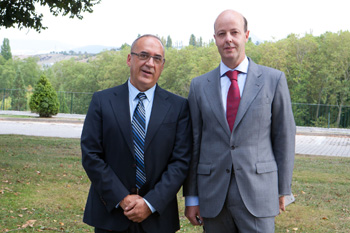Experts in Genetics and hematology to discuss the impact of genetic analysis in medicine
Doctors Juan Cruz Cigudosa and Felipe Prosper revealed the secrets of Genetics in the diagnosis and treatment of some cancers.

PHOTO: Manuel Castells
"Genetic analysis techniques and their implementation in clinical routine have modified the diagnosis, prognosis and treatment of hematological diseases". Drs. Felipe Prosper, hematologist at the Clínica Universidad de Navarraand Juan Cruz Cigudosa, specialist in Genetics from the Spanish National Cancer Research Center (CNIO), participated in a conference at roundtable, on the occasion of the 25th anniversary of the Genetic Analysis Service of the University of Navarra.
Dr. Prosper pointed out that"in diseases such as leukemias or myelomas, diagnoses are now more precise and treatment can be designed more specifically for groups of patients, depending on prognostic factors and specific alterations". For his part, Dr. Cigudosa referred to the advances of Genetics, its technologies and their applications to genetic diagnosis, focused on cancer diagnosis.
The event was attended by the Vice President of research of the University of Navarra, Iciar Astiasarán; the Dean of the School of Sciences, Ignacio López-Goñi; and the director of the Genetic Analysis Service, María José Calasanz, who reviewed the history of the service, and where Dr. Jesús San Miguel, director of Clinical and Translational Medicine of the CUN, acted as moderator.
Technology has helped to improve diagnostics.
In Cigudosa's opinion, "technological advances, derived from research on the genome, are allowing genetic testing to evolve and improve dramatically. These tests are now increasingly more complete, more reliable and more informative".
Using practical and real cases of cancer patients, the expert highlighted the usefulness of genetic analysis techniques such as karyotyping (the oldest), microarray genomics (from high performing) and massive sequencing, and stressed the idea that each test Genetics has a defined indication. "However, it is often necessary for them to complement each other to ensure the best diagnosis and treatment for the patient," he stressed.
